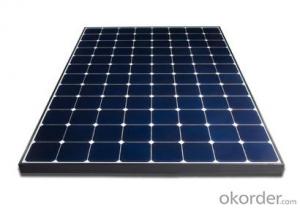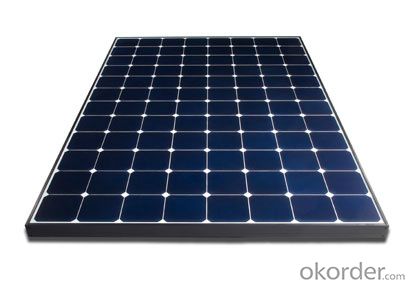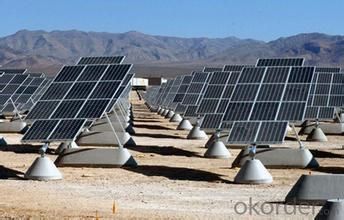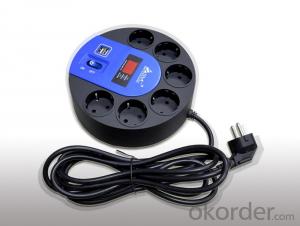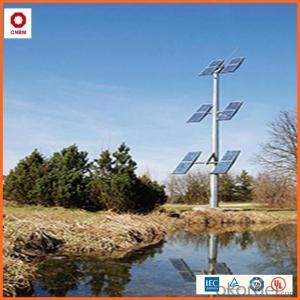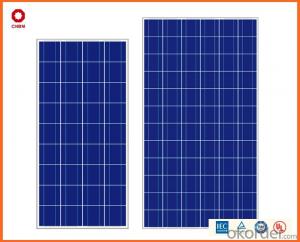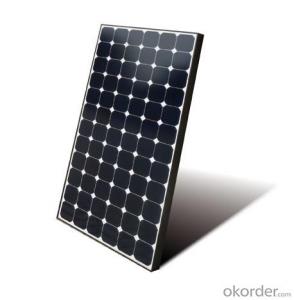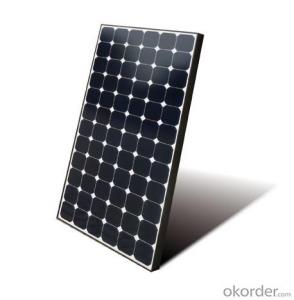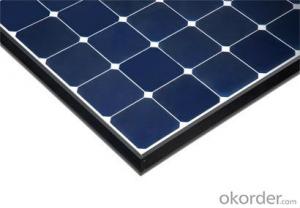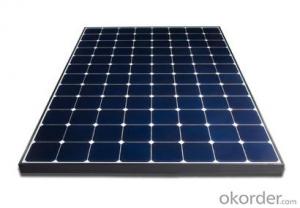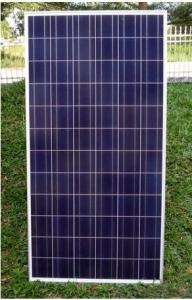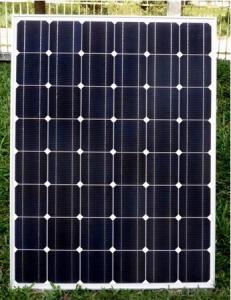Solar Energy Systems Quotes:CNBM On Grid System 800W with Certificate UL TUV CE
- Loading Port:
- Shanghai
- Payment Terms:
- TT OR LC
- Min Order Qty:
- 100 watt
- Supply Capability:
- 1000 watt/month
OKorder Service Pledge
OKorder Financial Service
You Might Also Like
Specification
CNBM On Grid System 800W with Certificate UL TUV CE
Product description
They range from small residential and commercial rooftop systems to large utility-scale solar power stations. Unlike stand-alone power systems, a grid-connected system rarely includes an integrated battery solution, as they are still very expensive. When conditions are right, the grid-connected PV system supplies the excess power, beyond consumption by the connected load, to the utility grid.
Connection of the photovoltaic power system can be done only through an interconnection agreement between the consumer and the utility company. The agreement details the various safety standards to be followed during the connection.[4]
Solar energy gathered by photovoltaic solar panels, intended for delivery to a power grid, must be conditioned, or processed for use, by a grid-connected inverter. Fundamentally, an inverter changes the DC input voltage from the PV to AC voltage for the grid. This inverter sits between the solar array and the grid, draws energy from each, and may be a large stand-alone unit or may be a collection of small inverters, each physically attached to individual solar panels. See AC Module. The inverter must monitor grid voltage, waveform, and frequency. One reason for monitoring is if the grid is dead or strays too far out of its nominal specifications, the inverter must not pass along any solar energy. An inverter connected to a malfunctioning power line will automatically disconnect in accordance with safety rules, for example UL1741, which vary by jurisdiction. Another reason for the inverter monitoring the grid is because for normal operation the inverter must synchronize with the grid waveform, and produce a voltage slightly higher than the grid itself, in order for energy to smoothly flow outward from the solar array.
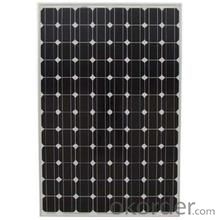
Application
Industrial
Commercial
Residential
Feature
Residential, grid-connected rooftop systems which have a capacity more than 10 kilowatts can meet the load of most consumers.[2] They can feed excess power to the grid where it is consumed by other users. The feedback is done through a meter to monitor power transferred. Photovoltaic wattage may be less than average consumption, in which case the consumer will continue to purchase grid energy, but a lesser amount than previously. If photovoltaic wattage substantially exceeds average consumption, the energy produced by the panels will be much in excess of the demand. In this case, the excess power can yield revenue by selling it to the grid. Depending on their agreement with their local grid energy company, the consumer only needs to pay the cost of electricity consumed less the value of electricity generated. This will be a negative number if more electricity is generated than consumed.[3] Additionally, in some cases, cash incentives are paid from the grid operator to the consumer.
Packaging
With carton and box
- Q: Do solar energy systems require regular panel replacements?
- No, solar energy systems do not require regular panel replacements. Solar panels are designed to be durable and can last for decades with proper maintenance.
- Q: How do solar energy systems contribute to reducing carbon emissions?
- Solar energy systems play a crucial role in the reduction of carbon emissions through various means. Firstly, solar energy, being a renewable and eco-friendly power source, helps tackle this issue. By utilizing solar panels that convert sunlight into electricity without emitting any greenhouse gases, solar energy eliminates the release of carbon dioxide and other harmful pollutants into the atmosphere, a stark contrast to traditional fossil fuel power plants. Secondly, solar energy has the potential to replace the usage of fossil fuels in multiple sectors. For instance, residential rooftops can be fitted with solar panels to generate electricity for homes, reducing the dependence on coal or natural gas for power generation. Similarly, solar farms can be established to produce large-scale solar power for commercial and industrial purposes. By substituting fossil fuels, solar energy systems contribute to the reduction of carbon emissions associated with electricity generation. Furthermore, solar energy can also be utilized for heating purposes. Solar thermal systems can capture the sun's heat and provide hot water for residential and commercial buildings. By incorporating solar thermal systems, the demand for gas or electricity to heat water diminishes, resulting in a decrease in carbon emissions during the water heating process. Moreover, the widespread adoption of solar energy systems can lead to an overall decrease in the demand for fossil fuels. As more households, businesses, and industries transition to solar power, the need for coal, oil, and natural gas diminishes. Consequently, this reduced demand for fossil fuels can drive down their production and consumption, resulting in a significant reduction in carbon emissions associated with their extraction, refining, and combustion. In conclusion, solar energy systems contribute to the reduction of carbon emissions by producing clean and renewable electricity, replacing fossil fuels, reducing the demand for traditional energy sources, and providing an alternative for heating purposes. By embracing solar power, we can make substantial progress in combating climate change and strive towards a sustainable future.
- Q: How can I find a reputable solar energy system installer?
- To locate a trustworthy installer for your solar energy system, you can follow these steps: 1. Educate yourself and conduct research: Begin by familiarizing yourself with solar energy systems, their functioning, and the various installation options. This will enable you to grasp the fundamentals and make well-informed decisions during the selection process. 2. Seek recommendations: Reach out to friends, family, colleagues, or neighbors who have already installed solar systems. Inquire about their experiences with the installers they hired, the quality of their work, and any challenges they encountered. Recommendations from reliable sources can be valuable in finding reputable installers. 3. Verify credentials and certifications: Ensure that the installer you are considering possesses the necessary licenses, certifications, and insurance to carry out solar installations. Look for certifications from esteemed organizations like the North American Board of Certified Energy Practitioners (NABCEP) or the Solar Energy Industries Association (SEIA). 4. Explore online reviews and ratings: Delve into online review platforms such as Google, Yelp, or Angie's List to read customer reviews and ratings about various solar installers in your vicinity. Pay attention to recurring positive or negative feedback and consider the overall reputation of the installers. 5. Obtain multiple quotes: Reach out to several solar installers and request detailed quotes for your specific project. Take note of the proposed equipment, warranties, pricing, and any additional services included. This will enable you to compare different installers and make an informed decision. 6. Request references and review past projects: Ask the installer for references to speak with previous customers about their experiences. Inquire about the quality of work, timeliness, customer service, and any issues encountered. Additionally, request examples of past projects completed by the installer to assess their workmanship and attention to detail. 7. Evaluate warranties and after-installation services: Inquire about the warranties provided by the installer for both the equipment and the installation work. A reputable installer will offer comprehensive warranties to ensure the longevity and performance of your solar system. Additionally, ask about any after-installation services they provide, such as maintenance, repairs, or monitoring. 8. Seek multiple opinions: If you have any doubts or concerns during the selection process, do not hesitate to seek a second opinion from another reputable installer. This can help you gain further clarity and confidence in your decision. Remember, finding a reputable solar energy system installer is vital for the long-term success and performance of your solar system. Take your time, conduct thorough research, and select an installer that aligns with your needs, budget, and values.
- Q: Can a solar energy system be installed on a flat roof?
- Certainly! Installing a solar energy system on a flat roof is indeed possible. In fact, flat roofs are often regarded as the perfect choice for solar panel installations due to their easy accessibility and unhindered exposure to sunlight. The installation process for flat roofs is relatively straightforward, as the panels can be directly mounted on the surface without requiring any additional structural modifications. Moreover, the angle and positioning of the solar panels can be optimized to maximize energy generation. However, it is crucial to take into account factors such as the roof's load-bearing capacity, available space, and potential shading problems during the installation planning phase. Seeking guidance from a professional solar installer or engineer can ensure a successful installation on a flat roof.
- Q: Are there any safety certifications required for solar energy systems?
- Yes, there are safety certifications required for solar energy systems. In most countries, solar energy systems must meet certain safety standards and regulations before they can be installed and used. These certifications ensure that the solar panels, inverters, and other components of the system are manufactured and installed in a way that minimizes the risk of electrical hazards, fire, and other safety issues. One of the most common safety certifications for solar energy systems is the International Electrotechnical Commission (IEC) 61730 standard. This certification ensures that the solar panels meet specific safety requirements, including mechanical strength, resistance to environmental factors, and electrical insulation. It also includes tests for fire resistance, which is crucial to prevent potential hazards. Additionally, solar inverters, which convert the direct current (DC) generated by solar panels into the alternating current (AC) used in homes and businesses, also require safety certifications. The most widely recognized certification for inverters is the IEC 62109 standard, which verifies that the inverters meet safety requirements such as electrical insulation, protection against overvoltage and overcurrent, and proper grounding. Furthermore, the installation of solar energy systems must comply with local electrical and building codes, which often include safety requirements. These codes ensure that the system is installed correctly and safely, with proper wiring, grounding, and protection against electrical faults. It's important for solar energy system manufacturers, installers, and users to adhere to these safety certifications and regulations to ensure the safe and reliable operation of solar energy systems. By doing so, the risk of electrical accidents, fires, and other safety hazards can be minimized, providing peace of mind to both the system owners and the surrounding community.
- Q: Can solar energy systems be used in areas with limited access to healthcare facilities?
- Yes, solar energy systems can be used in areas with limited access to healthcare facilities. These systems can provide a reliable and sustainable source of power for medical equipment, such as refrigeration units for vaccines and medicines, lighting for surgeries, and power for diagnostic devices. By ensuring access to electricity, solar energy systems can support the functioning of healthcare facilities and improve healthcare outcomes in areas without reliable grid connections.
- Q: Can solar energy systems be used for powering recycling facilities?
- Indeed, recycling facilities can certainly utilize solar energy systems for their power needs. Solar energy, a renewable and eco-friendly power source, can be harvested through the use of photovoltaic (PV) panels or solar thermal systems. These systems have the ability to convert sunlight into electricity or heat, which can then be employed to fuel a variety of operations within a recycling facility. The machinery and equipment necessary for recycling processes, such as conveyors, sorting machines, crushers, and compactors, can be powered by the electricity produced by solar panels. Additionally, solar energy can also be utilized to sustain lighting systems, ventilation, and heating/cooling systems, guaranteeing an efficient and sustainable functioning of the facility. Opting for solar energy to power recycling facilities brings forth numerous advantages. Firstly, it diminishes reliance on conventional fossil fuel-based electricity, consequently decreasing carbon emissions and mitigating environmental impact. Secondly, solar energy systems provide a steady and predictable source of power, thereby reducing vulnerability to power outages or price fluctuations. Furthermore, utilizing solar power can result in energy cost savings for recycling facilities in the long term, as the initial investment in solar panels can be compensated by reduced electricity bills over time. To conclude, solar energy systems are a feasible and environmentally-conscious choice for powering recycling facilities. By harnessing the energy of the sun, these facilities can function sustainably, reduce their carbon footprint, and contribute to a cleaner and more sustainable future.
- Q: Are there any government incentives or rebates for installing solar energy systems?
- Yes, there are government incentives and rebates available for installing solar energy systems. These incentives vary by country and region, but they often include tax credits, grants, and rebates that aim to encourage the adoption of renewable energy sources like solar power. These incentives can help offset the upfront costs of installation and make solar energy systems more affordable for homeowners and businesses. It is recommended to check with local authorities or renewable energy agencies to learn about specific incentives available in your area.
- Q: Can solar energy systems be used for space exploration?
- Yes, solar energy systems can be used for space exploration. In fact, solar panels are commonly used in spacecraft to provide power for various systems and instruments. Solar energy is reliable, abundant, and can be harnessed even in space where sunlight is not filtered by the Earth's atmosphere.
- Q: Can a solar energy system be used off-grid?
- Certainly! A solar energy system has the capability to function without being connected to the main power grid. Stand-alone systems, also referred to as off-grid systems, are specifically designed to generate and store electricity in regions that do not have access to the conventional power grid. These systems typically comprise of solar panels, a battery bank, and an inverter. Throughout the day, the solar panels convert sunlight into electricity, which can then be utilized to power various appliances, lights, and other electrical devices. Any surplus energy is stored in the battery bank for usage during periods without sunlight or during the night. Off-grid solar energy systems are extremely beneficial in remote areas or places where access to the power grid is unreliable or non-existent, as they provide a sustainable and self-sufficient source of electricity.
Send your message to us
Solar Energy Systems Quotes:CNBM On Grid System 800W with Certificate UL TUV CE
- Loading Port:
- Shanghai
- Payment Terms:
- TT OR LC
- Min Order Qty:
- 100 watt
- Supply Capability:
- 1000 watt/month
OKorder Service Pledge
OKorder Financial Service
Similar products
Hot products
Hot Searches
Related keywords
